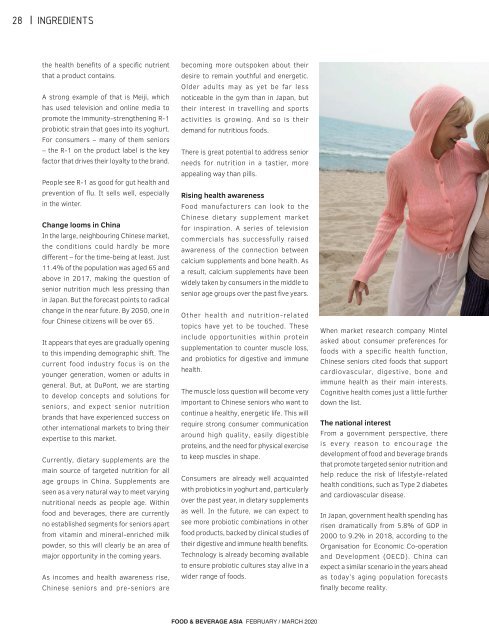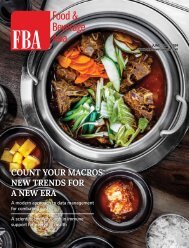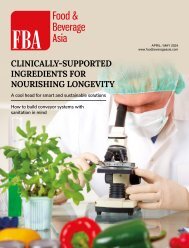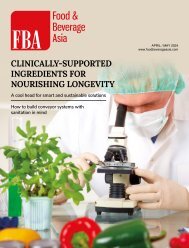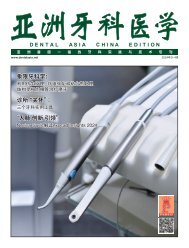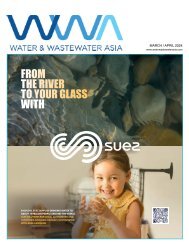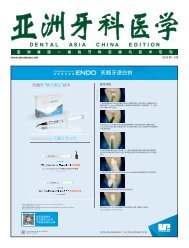Food & Beverage Asia February/March 2020
Food & Beverage Asia (FBA) is the leading source of food and beverage news in Asia since 2002. FBA delivers a comprehensive view of the food and beverage landscape, spanning across the latest health and nutrition trends and industry innovations in ingredients, recipe formulations, food science, sustainability, packaging, and automation, as well as advancements in agri and food-tech.
Food & Beverage Asia (FBA) is the leading source of food and beverage news in Asia since 2002. FBA delivers a comprehensive view of the food and beverage landscape, spanning across the latest health and nutrition trends and industry innovations in ingredients, recipe formulations, food science, sustainability, packaging, and automation, as well as advancements in agri and food-tech.
You also want an ePaper? Increase the reach of your titles
YUMPU automatically turns print PDFs into web optimized ePapers that Google loves.
28<br />
INGREDIENTS<br />
the health benefits of a specific nutrient<br />
that a product contains.<br />
A strong example of that is Meiji, which<br />
has used television and online media to<br />
promote the immunity-strengthening R-1<br />
probiotic strain that goes into its yoghurt.<br />
For consumers – many of them seniors<br />
– the R-1 on the product label is the key<br />
factor that drives their loyalty to the brand.<br />
People see R-1 as good for gut health and<br />
prevention of flu. It sells well, especially<br />
in the winter.<br />
Change looms in China<br />
In the large, neighbouring Chinese market,<br />
the conditions could hardly be more<br />
different – for the time-being at least. Just<br />
11.4% of the population was aged 65 and<br />
above in 2017, making the question of<br />
senior nutrition much less pressing than<br />
in Japan. But the forecast points to radical<br />
change in the near future. By 2050, one in<br />
four Chinese citizens will be over 65.<br />
It appears that eyes are gradually opening<br />
to this impending demographic shift. The<br />
current food industry focus is on the<br />
younger generation, women or adults in<br />
general. But, at DuPont, we are starting<br />
to develop concepts and solutions for<br />
seniors, and expect senior nutrition<br />
brands that have experienced success on<br />
other international markets to bring their<br />
expertise to this market.<br />
Currently, dietary supplements are the<br />
main source of targeted nutrition for all<br />
age groups in China. Supplements are<br />
seen as a very natural way to meet varying<br />
nutritional needs as people age. Within<br />
food and beverages, there are currently<br />
no established segments for seniors apart<br />
from vitamin and mineral-enriched milk<br />
powder, so this will clearly be an area of<br />
major opportunity in the coming years.<br />
As incomes and health awareness rise,<br />
Chinese seniors and pre-seniors are<br />
becoming more outspoken about their<br />
desire to remain youthful and energetic.<br />
Older adults may as yet be far less<br />
noticeable in the gym than in Japan, but<br />
their interest in travelling and sports<br />
activities is growing. And so is their<br />
demand for nutritious foods.<br />
There is great potential to address senior<br />
needs for nutrition in a tastier, more<br />
appealing way than pills.<br />
Rising health awareness<br />
<strong>Food</strong> manufacturers can look to the<br />
Chinese dietary supplement market<br />
for inspiration. A series of television<br />
commercials has successfully raised<br />
awareness of the connection between<br />
calcium supplements and bone health. As<br />
a result, calcium supplements have been<br />
widely taken by consumers in the middle to<br />
senior age groups over the past five years.<br />
Other health and nutrition-related<br />
topics have yet to be touched. These<br />
include opportunities within protein<br />
supplementation to counter muscle loss,<br />
and probiotics for digestive and immune<br />
health.<br />
The muscle loss question will become very<br />
important to Chinese seniors who want to<br />
continue a healthy, energetic life. This will<br />
require strong consumer communication<br />
around high quality, easily digestible<br />
proteins, and the need for physical exercise<br />
to keep muscles in shape.<br />
Consumers are already well acquainted<br />
with probiotics in yoghurt and, particularly<br />
over the past year, in dietary supplements<br />
as well. In the future, we can expect to<br />
see more probiotic combinations in other<br />
food products, backed by clinical studies of<br />
their digestive and immune health benefits.<br />
Technology is already becoming available<br />
to ensure probiotic cultures stay alive in a<br />
wider range of foods.<br />
When market research company Mintel<br />
asked about consumer preferences for<br />
foods with a specific health function,<br />
Chinese seniors cited foods that support<br />
cardiovascular, digestive, bone and<br />
immune health as their main interests.<br />
Cognitive health comes just a little further<br />
down the list.<br />
The national interest<br />
From a government perspective, there<br />
is every reason to encourage the<br />
development of food and beverage brands<br />
that promote targeted senior nutrition and<br />
help reduce the risk of lifestyle-related<br />
health conditions, such as Type 2 diabetes<br />
and cardiovascular disease.<br />
In Japan, government health spending has<br />
risen dramatically from 5.8% of GDP in<br />
2000 to 9.2% in 2018, according to the<br />
Organisation for Economic Co-operation<br />
and Development (OECD). China can<br />
expect a similar scenario in the years ahead<br />
as today’s aging population forecasts<br />
finally become reality.<br />
FOOD & BEVERAGE ASIA FEBRUARY / MARCH <strong>2020</strong>


